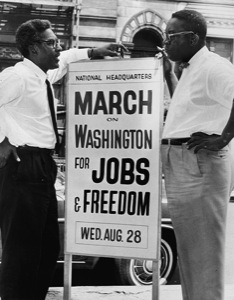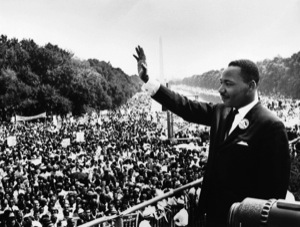
February is African American History Month, also known as Black History Month. It is as much a celebration of accomplishments within the African American community as it is recognition of a journey of struggles to overcome in pursuit of basic civil rights.
It is an unfinished journey though, that encompasses Lincoln’s 1863 Emancipation Proclamation, which effectively freed a warring nation’s slaves, through the 1963 March on Washington by thousands of Americans unhappy with civil rights progress for minorities, which featured Martin Luther King’s famous “I Have a Dream” speech, to a modern day that has seen America’s first African American president.
Yet, for centuries, history books have failed to mention the contribution that African Americans, and other minorities, have played in the development of America.
As a response, African American History Month began in 1926 through the efforts of historian Carter G. Woodson and what was at the time known as Negro History Week. The intention of the week was to acknowledge both the accomplishments and lives of major figures in African American history.
The list of famous LGBT African Americans is long, and runs the gamut from activists and politicians, to athletes and entertainment figures: including: Bayard Rustin, advisor to Martin Luther King Jr. and a chief organizer of the March on Washington; Josephine Baker, actress and singer; James Baldwin, author; Sheryl Swoopes, WNBA professional basketball player; and Wanda Sykes, comedian and actress.
However, African American History Month has now turned into something of a lightening rod of controversy with detractors and proponents in seemingly equal numbers.
Critics have even gone so far as to label it racist on the one hand, and at the same time ineffective and essentially redundant in today’s America with its first African American president and where minorities are increasingly well represented in both politics and government.
Proponents argue however, that African American history still needs to be remembered and that the lives and accomplishments of otherwise forgotten African Americans need to be acknowledged.
Such advocates counter the racist charge with the claim that, the reason there is no White History Month, is because it already exists, under the guise of traditional, mainstream history books.
Perhaps African American History Month then, by its very definition, is not so much racist, as it is intentionally biased, intended to counter the existing, white-oriented history already in place.
Supporters also assert that such a month is important as a way to connect African Americans in modern day America with the color struggles that previous civil rights advocates had to endure in past generations and that through it the continued racial discrimination in society can be addressed.
However, some maintain that African American History Month is superficial, and that it at the same time marginalizes the contributions of African American history into a single 28-day period.

Oscar-winning actor Morgan Freeman, controversially stated in a 60 Minutes interview in 2005, “You’re going to relegate my history to a month? I don’t want a Black History Month. Black history is American history.”
The question for many though is how that can be achieved.
Some critics contend that too much time is being spent on highlighting historical events and historical figures outside of a social context and that the cause of African American progress in current society would be better served by focusing on inner-city social problems, and racial disparities in housing, healthcare and employment.
And yet advocates maintain that another value of an African American History Month is as a tool to raise awareness about African American history and social disparity, and as a way to educate.
Charles Radcliffe, chief of global issues at the Office of the UN High Commissioner for Human Rights (OHCHR), sees education as a major benefit of African American History Month. “One of the lessons of the fight against racism is that changing the laws, putting in place legal protection against discrimination, isn’t enough,” says Radcliffe. “You need to tackle prejudice at its roots, through education. African American History Month has helped to change the attitudes of millions of young people by making them aware of the injustice of racism. A similar educational process is needed to tackle homophobia, which remains deep-seated in most societies.”
Charles W. Patmon Jr., president of San Diego UrbanPride, sees African American History Month as a stepping-stone to a more integrated society, saying, “African American History Month is relevant because all Americans need to know the history of our country. For so long African American triumphs have been ignored in mainstream education. Unfortunately, we have to have a month to highlight these accomplishments. But until we become a society that recognizes and salutes contributions from all people, it is necessary.”
In addition, there are those that see the struggle for African American rights as a positive example for other minorities in their struggle for recognition and civil rights, and that includes the LGBT community.
Says Larry Baza, 2011 Champion of Pride award winner, “The Civil Rights Movement, the fight for equal rights in the U.S.A, was born in African American communities. The non-violent path of protest and the strategy of taking cases of institutionalized racism, denial of civil rights through the courts, under the leadership of Dr. Martin Luther King provided the basic model for every subsequent civil rights struggle, including our own LGBT fight for equal rights.”
Adds Patmon, “Both the African Americans and LGBT communities share commonalities when it comes to civil rights. Everyone must realize that ‘their’ struggle is ‘our’ struggle and we must work together to achieve goals that are mutually beneficial.”
As a result, some would contend that the most significant association between African American History Month and LGBT History Month is a shared common struggle in pursuit of basic civil rights in the face of hostility and prejudice.
LGBT History Month, in October, celebrates significant accomplishments and LGBT figures in the gay rights movement, as well as in the civil rights movement generally.
For Patmon, African American History Month and LGBT History Month have many connections.

“African American History Month relates to LGBT History Month because during each we should recognize contributions from both communities,” says Patmon. “For example, Bayard Rustin was a strong activist for civil rights. We honor his contributions to the civil rights movement. In African American History Month, he is recognized because he is African American; in LGBT History Month, he should be recognized because he was gay. Each community needs to highlight individuals from the other.”
For the most part then, while African American History Month has its detractors, its original goal of publicly acknowledging significant figures and historical events in the African American community, and its availability as an educational tool, still ring true.
And as long as history books fail to include the contributions of minorities within their covers, the need for such events is unlikely to diminish.











